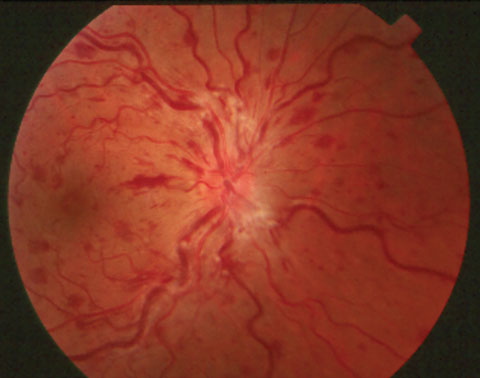 |
|
Retinal vascular occlusion has a multifactorial pathogenesis, but it may share similarities with COVID-19 effects, such as increased thrombosis and hypoxia. Photo: Joseph W. Sowka, OD. Click image to enlarge. |
COVID-19 often has serious, long-lasting health consequences, including some forms of ocular disease. There have been several reports of retinal complications, including retinal vascular occlusion. This disease has a poor prognosis and often leads to irreversible vision loss. Given that COVID-19 has had such a wide-ranging impact, researchers investigated the risk of retinal vascular occlusion after COVID-19 diagnosis. They found that there may be an association.
The retrospective cohort study included 46 healthcare organizations in the United States. COVID-19 was confirmed by lab findings. In total, more than 1.4 million individuals’ data were analyzed. The researchers reported that COVID-19 patients had a significantly higher risk of branch retinal vein occlusion than those without COVID-19, and that branch retinal vein occlusion showed significantly higher cumulative incidence in COVID-19 patients as well. Transient central retinal vein occlusion and branch retinal vein occlusion were observed in patients 12 weeks after diagnosis.
“Since retinal vascular occlusions are rare and COVID-19 is an emerging infectious disease, it is difficult to establish the definite relationship between both,” the researchers noted in their Retina paper. They explained that their findings bolster prior studies and case series on this relationship. “Branch retinal vein occlusion was the only subtype of retinal vascular occlusion correlated with COVID-19 infection when considering the entire two-year duration of the study, and higher risk was eight to 10 weeks after a COVID-19 diagnosis,” they wrote. They added that studies in clinical practice will help elucidate this correlation and its underlying mechanisms.
“This also reiterates the necessity for careful investigation and for ophthalmologists to evaluate the possibility of COVID-19 in vulnerable patients with a new manifestation of branch retinal vein occlusion who may have undiagnosed active or prior COVID-19,” they concluded in their paper.
Li J, Wei JC, Wang Y, et al. Retinal vascular occlusion and COVID-19 diagnosis: a multicenter and population-based study. Retina 2023. [Epub ahead of print]. |

